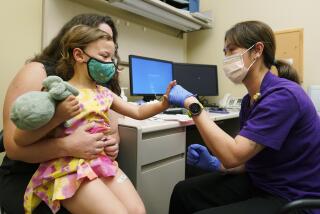Pediatricians issue a call to aid children facing ‘toxic stress’
- Share via
It will either disappear into the rubbish heap of well-meaning but ill-timed social treatises or mark the beginning of a new age of activism by the physicians who care for the nation’s children: the American Academy of Pediatrics on Monday issued a technical report linking “toxic stress” in childhood to a lifetime of mental, intellectual and physical ills, and called on pediatricians “to catalyze fundamental change in early childhood policy and services.”
The academy’s policy statement, released Monday in the journal Pediatrics draws on a growing body of research on genetics, child development, the brain and social behavior to show that children who face adversity are likely to become unhealthy adults plagued by problems that include poor literacy, substance abuse, failed relationships and poverty. An accompanying technical report reviews in particular detail the evidence that when a child’s “fight or flight” response to adversity is engaged repeatedly throughout childhood, his brain develops in ways that can impair judgment, learning and future responses to stress.
And the harm doesn’t stop there: The technical report cites “strong scientific consensus” that a child’s extreme or ongoing experience of neglect, domestic violence, parental substance abuse or a mother’s chronic depression can nudge his or her basic genetic endowment in negative directions that are carried into the next generation and beyond. The “ecobiodevelopmental” perspective that this new body of research offers tells pediatricians that, as guardians of children’s health, they are also shaping society and its future, the American Academy of Pediatrics says.
“Pediatricians are now armed with new information about the adverse effects of toxic stress on brain development, as well as deeper understanding of the early-life origin of many adult diseases,” the American Academy of Pediatrics statement asserts. “As trusted authorities in child health and development, pediatric providers must now complement the early identification of developmental concerns with a greater focus on those interventions and community investments that reduce external threats to healthy brain growth.”
In helping children whose lives or relationships are marred by chaos, illness, violence or poverty, pediatricians have a few important toeholds.
“It is not adversity alone that predicts poor outcomes. It is the absence or insufficiency of healthy relationships that reinforce healthy adaptations to stress,” says the American Academy of Pediatrics’ policy statement titled “Early Childhood Adversity, Toxic Stress, and the Role of the Pediatrician: Translating Developmental Science into Lifelong Health.”
As trusted advisors to parents, pediatricians can help ensure that children have the relationships they need to use some stressors as a means to learn and grow, the American Academy of Pediatrics says. Pediatricians can help foster those relationships with advice about positive parenting and ways to support a toddler’s emerging social, emotional and language skills. They can recognize and intervene when they’re lacking. And by exercising their stature in their communities, pediatricians can play a leading role in building institutions that provide support and healthy relationships to children outside the home.
One of the policy statement’s most practical recommendations is that pediatricians move aggressively to adopt a relatively new model of medical practice--the patient-centered “medical home.” In that model, pediatricians not only track children’s growth and attend to their ear infections and vaccinations; they also become a gateway to classes for new parents and after-school programs, to resources that ensure good nutrition and school readiness skills, and to help for parents struggling with domestic abuse, divorce or mental illness.
New findings in the childhood origins of adult illness “require a fundamental shift in the way the general public and policy makers view and invest in early childhood,” the American Academy of Pediatrics’ newest policy statement says. Especially when budget constraints are prompting debates over spending priorities, it adds, “pediatricians should be vocal advocates for development and implementation of new, evidence-based interventions (regardless of the provider or venue) that reduce sources of toxic stress and/or mitigate their adverse effects on young children.”
Quoting the abolitionist and former slave Frederick Douglass, “it is easier to build strong children than to repair broken men.”







